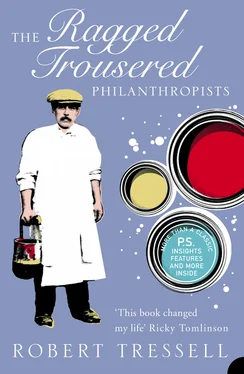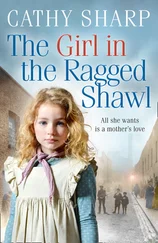They said it meant getting wet through going home, but all the same. Thank God it was nearly five o’clock!
That night as Easton walked home through the rain he felt very depressed. It had been a very bad summer for most people and he had not fared better than the rest. A few weeks with one firm, a few days with another, then out of a job, then on again for a month perhaps, and so on.
William Easton was a man of medium height, about twenty-three years old, with fair hair and moustache and blue eyes. He wore a stand-up collar with a coloured tie and his clothes, though shabby, were clean and neat.
He was married: his wife was a young woman whose acquaintance he had made when he happened to be employed with others painting the outside of the house where she was a general servant. They had ‘walked out’ for about fifteen months. Easton had been in no hurry to marry, for he knew that, taking good times with bad, his wages did not average a pound a week. At the end of that time, however, he found that he could not honourably delay longer, so they were married.
That was twelve months ago.
As a single man he had never troubled much if he happened to be out of work; he always had enough to live on and pocket money besides, but now that he was married it was different; the fear of being ‘out’ haunted him all the time.
He had started for Rushton & Co. on the previous Monday after having been idle for three weeks, and as the house where he was working had to be done right through he had congratulated himself on having secured a job that would last till Christmas; but he now began to fear that what had befallen Jack Linden might also happen to himself at any time. He would have to be very careful not to offend Crass in any way. He was afraid the latter did not like him very much as it was. Easton knew that Crass could get him the sack at any time and would not scruple to do so if he wanted to make room for some crony of his own. Crass was the ‘coddy’ or foreman of the job. Considered as a workman he had no very unusual abilities; he was if anything inferior to the majority of his fellow workmen. But although he had but little real ability he pretended to know everything, and the vague references he was in the habit of making to ‘tones’, and ‘shades’, and ‘harmony’, had so impressed Hunter that the latter had a high opinion of him as a workman. It was by pushing himself forward in this way and by judicious toadying to Hunter that Crass managed to get himself put in charge of work.
Although Crass did as little work as possible himself he took care that the others worked hard. Any man who failed to satisfy him in this respect he reported to Hunter as being ‘no good’, or ‘too slow for a funeral’. The result was that this man was dispensed with at the end of the week. The men knew this, and most of them feared the wily Crass accordingly, though there were a few whose known abilities placed them to a certain extent above the reach of his malice. Frank Owen was one of these.
There were others who by the judicious administration of pipefuls of tobacco and pints of beer, managed to keep in Crass’s good graces and often retained their employment when better workmen were ‘stood off’.
As he walked home through the rain thinking of these things, Easton realized that it was not possible to foresee what a day or even an hour might bring forth.
By this time he had arrived at his home; it was a small house, one of a long row of similar ones, and it contained altogether four rooms.
The front door opened into a passage about two feet six inches wide and ten feet in length, covered with oilcloth. At the end of the passage was a flight of stairs leading to the upper part of the house. The first door on the left led into the front sitting-room, an apartment about nine feet square, with a bay window. This room was very rarely used and was always very tidy and clean. The mantelpiece was of wood painted black and ornamented with jagged streaks of red and yellow, which were supposed to give it the appearance of marble. On the walls was a paper with a pale terra-cotta ground and a pattern consisting of large white roses with chocolate coloured leaves and stalks.
There was a small iron fender with fire-irons to match, and on the mantelshelf stood a clock in a polished wood case, a pair of blue glass vases, and some photographs in frames. The floor was covered with oilcloth of a tile pattern in yellow and red. On the walls were two or three framed coloured prints such as are presented with Christmas numbers of illustrated papers. There was also a photograph of a group of Sunday School girls with their teachers with the church for the background. In the centre of the room was a round deal table about three feet six inches across, with the legs stained red to look like mahogany. Against one wall was an old couch covered with faded cretonne, four chairs to match standing backs to wall in different parts of the room. The table was covered with a red cloth with a yellow crewel work design in the centre and in each of the four corners, the edges being overcast in the same material. On the table were a lamp and a number of brightly bound books.
Some of these things, as the couch and the chairs, Easton had bought second-hand and had done up himself. The table, oilcloth, fender, hearthrug, etc, had been obtained on the hire system and were not yet paid for. The windows were draped with white lace curtains and in the bay was a small bamboo table on which reposed a large Holy Bible, cheaply but showily bound.
If anyone had ever opened this book they would have found that its pages were as clean as the other things in the room, and on the flyleaf might have been read the following inscription: ‘To dear Ruth, from her loving friend Mrs Starvem with the prayer that God’s word may be her guide and that Jesus may be her very own Saviour. Oct. 12. 19 –’
Mrs Starvem was Ruth’s former mistress, and this had been her parting gift when Ruth left to get married. It was supposed to be a keepsake, but as Ruth never opened the book and never willingly allowed her thoughts to dwell upon the scenes of which it reminded her, she had forgotten the existence of Mrs Starvem almost as completely as that well-to-do and pious lady had forgotten hers.
For Ruth, the memory of the time she spent in the house of ‘her loving friend’ was the reverse of pleasant. It comprised a series of recollections of petty tyrannies, insults and indignities. Six years of cruelly excessive work, beginning every morning two or three hours before the rest of the household were awake and ceasing only when she went exhausted to bed, late at night.
She had been what is called a ‘slavey’ but if she had been really a slave her owner would have had some regard for her health and welfare: her ‘loving friend’ had had none. Mrs Starvem’s only thought had been to get out of Ruth the greatest possible amount of labour and to give her as little as possible in return.
When Ruth looked back upon that dreadful time she saw it, as one might say, surrounded by a halo of religion. She never passed by a chapel or heard the name of God, or the singing of a hymn, without thinking of her former mistress. To have looked into this Bible would have reminded her of Mrs Starvem; that was one of the reasons why the book reposed, unopened and unread, a mere ornament on the table in the bay window.
The second door in the passage near the foot of the stairs led into the kitchen or living-room: from here another door led into the scullery. Upstairs were two bedrooms.
As Easton entered the house, his wife met him in the passage and asked him not to make a noise as the child had just gone to sleep. They kissed each other and she helped him to remove his wet overcoat. Then they both went softly into the kitchen.
Читать дальше












